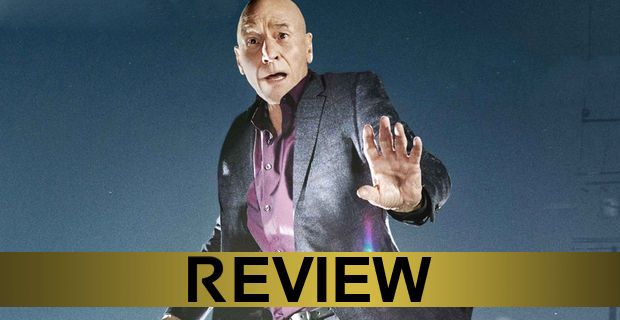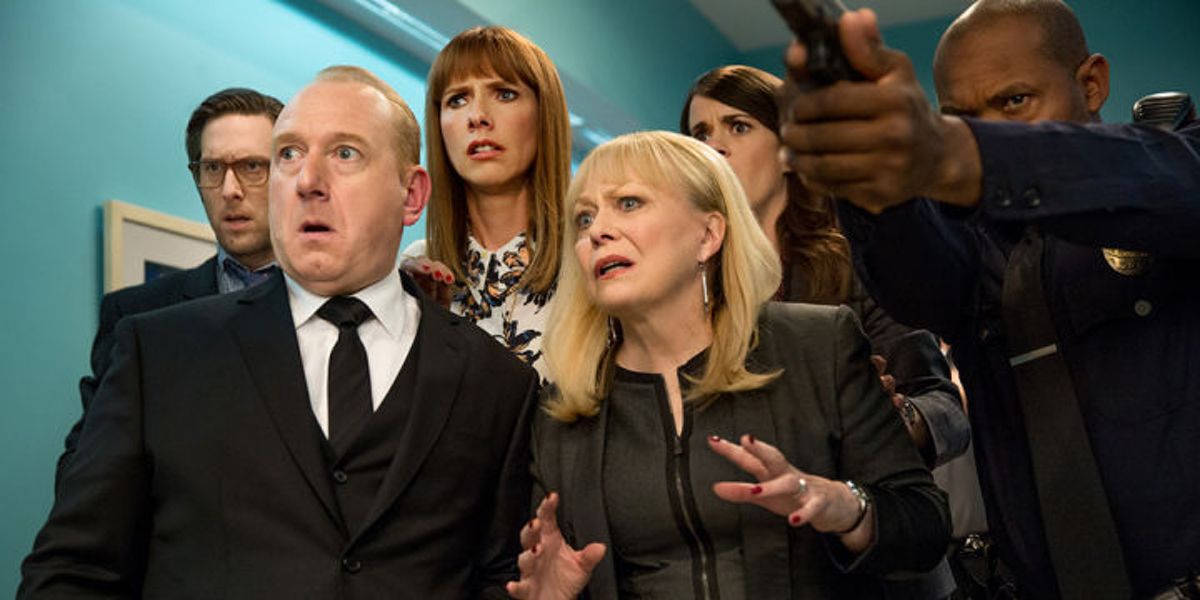[This is a review of Blunt Talk season 1, episode 10. There will be SPOILERS.]
-
Jason Schwartzman's Duncan Adler, the thrice-bumped patriarch of the zero-impact family serves to underline the journey of Walter Blunt throughout the first, unexpectedly comforting hangout-worthy season of Blunt Talk. Described as a "well-intentioned madman," Duncan has a message for the people of Earth, a message that is near and dear to Walter's heart, but one that has, nonetheless gone unheard. That unheard message of zero-impact living parallels Walter's own inability to make an impact and to deliver the message that he so desperately (but not desperately enough) wanted to make over the course of the season.
Where 'Let's Save Central Florida! Let's Save Midtown!' finds its success, however, is in the way it presents Walter's inability to accomplish his goals as a function of a greater personal need, rather than the absence of some capacity on his behalf. And in that, Blunt Talk expands on the ideas of the series itself. What began as a series about a reckless, debauched, irresponsible newsman became the oddly compassionate story of a man searching for a way to fix himself, without ever really knowing that was the journey he was on. And the finale finds its greatest success in the way Walter comes to understand his path, and just how much further he must go before he can busy himself with the task of spreading his great message. In other words, Walter needs to fix himself before he can set himself to the task of fixing the world.
To that end, Blunt Talk makes terrific use of all the stories of personal foibles and distress (self-inflicted and otherwise) that have defined nearly each of the show's characters during its first season. And to a certain extent, Walter is the same sort of well-intentioned madman that Duncan Adler gives body and voice to. He is a passionate sort with an enormously powerful idea, but also a considerable problem preventing him from seeding the idea and seeing if it will take root. Whereas Duncan was stymied time and time again by the whims of the 24-hour news cycle and Walter's own fickle attention span, Walter himself has been stymied by untreated issues stemming from his time in the Falklands and his increasingly ineffective manner of self-medication. In other words, Walter learns that he may have been suffering from PTSD for the past 30 years, and that his body has been set to a default state of fear.
As effective as this discovery is in explaining who Walter Blunt really is and why he has been doing all the things that he has over the last 10 episodes, it also works to color the other characters in the show's ensemble as well. And while that may seem like Blunt Talk and Jonathan Ames are casting a wide net, trying to catch many characters in it at once, that's not necessarily the case. Instead, the finale does what the series has done so well all season: provide insight into these characters' headspaces by using Walter's behavior and experiences as the stick by which all others are measured.
Specifically, this holds the greatest amount of meaning for Celia and Jim, who have been on a bit of a downward trajectory all season long. Jim and Celia's burgeoning relationship and fondness for one another doesn't blossom into full-blown romance during the finale, but rather into something that perhaps holds the promise of greater emotional significance. Like Walter, neither character is ready to commit to something larger than a rediscovery of who they are at the moment. So when Jim refers to himself as a rescue dog "permanently scared of other people" it becomes clear just how important and fragile the connection he shares with Celia actually is.
There is a level of restraint in keeping things low key that Blunt Talk has found success with all season long. That may seem like the wrong way to describe a show that ends with an "eco-terrorist" forcing Walter to interview him at gunpoint and then disappearing into a flash mob of lookalikes, but it's true. Over the past 10 episodes, the series has exceled at delivering big moments for laughs, while at the same time finding the emotionality lurking deep within via less overt ways. This gives the show the same sort of hangout quality that was such a large part of the appeal of Ames' previous effort Bored to Death, another seemingly aimless comedy with a larger-than-expected heart.
While 'Let's Save Central Florida! Let's Save Midtown' doesn't necessarily pack the emotional punch of, say, 'Meth or No Meth, You Still Gotta Floss,' it doesn't necessarily have to. The series has already established a strong foundation of compassion and empathy, so when Jim tells Celia how he feels wearing his ostrich pillow, Harry finds himself unexpectedly tumescent while spooning Rosalie, or Walter realizes he may have been suffering from PTSD for three decades, Blunt Talk uses those personal discoveries and steps toward emotional growth as a means of paying off the individual and collective arcs that have been simmering all season long.
If anything, Blunt Talk proved itself a surprise in terms of the sort of comedy and the sort of show it wanted to be in season 1. Given the pedigree of executive producer Seth MacFarlane, and the raunchy, out-of-control sensibilities it was marketed as having, the series turned out to be something quite different. It was an unexpectedly human series, one that, in its finale, revealed the personal nature of the narrative's welcome detour to have been a journey well worth taking.
-
Blunt Talk will return for season 2 on Starz in 2016.



